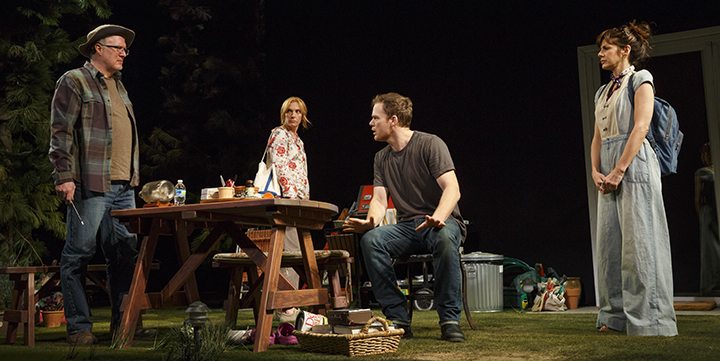
 All of the characters in Will Eno’s “The Realistic Joneses” seem to have a little bit of an oversharing problem. When John (Michael C. Hall) tells his neighbor Jennifer Jones (Toni Collette) she has pretty eyes, she replies by saying that she actually needs glasses, a remark that’s both strangely appropriate, if too modest, but also feels like some sort of non sequitur. The four characters in Eno’s insular view of smalltown life, seems to suggest that their tendency to talk more than they should is a way for them to compensate for their utter fear of silence.
All of the characters in Will Eno’s “The Realistic Joneses” seem to have a little bit of an oversharing problem. When John (Michael C. Hall) tells his neighbor Jennifer Jones (Toni Collette) she has pretty eyes, she replies by saying that she actually needs glasses, a remark that’s both strangely appropriate, if too modest, but also feels like some sort of non sequitur. The four characters in Eno’s insular view of smalltown life, seems to suggest that their tendency to talk more than they should is a way for them to compensate for their utter fear of silence.
When we first meet Jennifer, she’s sitting in her yard with her husband Bob (Tracy Letts), when they are interrupted by the other Joneses, John and his wife Pony (Marisa Tomei), the new neighbors who arrive with the excuse of introducing themselves. Before long, Jennifer has spilled the beans and is telling them all about her husband’s rare disease and why they moved to their unnamed little town because it’s home to the world's greatest specialist in the matter. This innocuous meeting leads to further encounters between the four characters who reluctantly become friends. We’ve seen similar dynamics explored before, with profounder repercussions, as well as with more memorable scenes, which is why “The Realistic Joneses” is worth mostly to see its cast.
Fresh from his Tony-win for “Who’s Afraid of Virginia Woolf”, Letts keeps hitting them out of the park. If his Bob Jones is a slight riff on George - minus the inhuman viciousness - it has more to do with Eno’s writing, than Letts’ performance. As a man facing semi-impending death, he creates a character who allows himself to be afraid onstage. That we can see his fear, despite Bob’s best attempts to remain proud and serene, speaks highly of Letts’ abilities. Hall is serviceable, if not particularly special and Collette, who often seems to have trouble projecting her voice, is both tender and perhaps the show’s most likable character.
But it was Tomei who truly captured the ennui, desperation and comedic existentialism of Eno’s words. Her dimwitted Pony not only has to make justice to her name (“it was a word before your parents used it” she is informed) but she also has to feign interest in what to her must seem like an endless charade. Her airheadedness has less to do with her not being smart, and more with her knowing exactly what to do with her brains and in what situations. Pony is putting on a neverending performance, because unlike all the others, her fear of silence isn’t because she’ll be left alone, but because she’ll end up with herself.